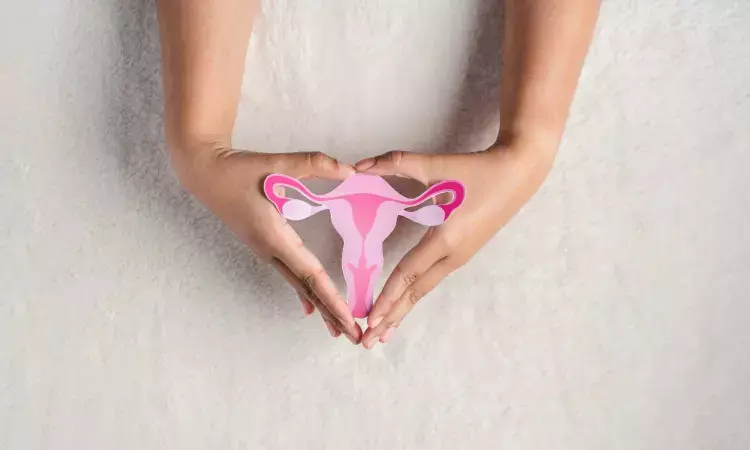- Home
- Medical news & Guidelines
- Anesthesiology
- Cardiology and CTVS
- Critical Care
- Dentistry
- Dermatology
- Diabetes and Endocrinology
- ENT
- Gastroenterology
- Medicine
- Nephrology
- Neurology
- Obstretics-Gynaecology
- Oncology
- Ophthalmology
- Orthopaedics
- Pediatrics-Neonatology
- Psychiatry
- Pulmonology
- Radiology
- Surgery
- Urology
- Laboratory Medicine
- Diet
- Nursing
- Paramedical
- Physiotherapy
- Health news
- Fact Check
- Bone Health Fact Check
- Brain Health Fact Check
- Cancer Related Fact Check
- Child Care Fact Check
- Dental and oral health fact check
- Diabetes and metabolic health fact check
- Diet and Nutrition Fact Check
- Eye and ENT Care Fact Check
- Fitness fact check
- Gut health fact check
- Heart health fact check
- Kidney health fact check
- Medical education fact check
- Men's health fact check
- Respiratory fact check
- Skin and hair care fact check
- Vaccine and Immunization fact check
- Women's health fact check
- AYUSH
- State News
- Andaman and Nicobar Islands
- Andhra Pradesh
- Arunachal Pradesh
- Assam
- Bihar
- Chandigarh
- Chattisgarh
- Dadra and Nagar Haveli
- Daman and Diu
- Delhi
- Goa
- Gujarat
- Haryana
- Himachal Pradesh
- Jammu & Kashmir
- Jharkhand
- Karnataka
- Kerala
- Ladakh
- Lakshadweep
- Madhya Pradesh
- Maharashtra
- Manipur
- Meghalaya
- Mizoram
- Nagaland
- Odisha
- Puducherry
- Punjab
- Rajasthan
- Sikkim
- Tamil Nadu
- Telangana
- Tripura
- Uttar Pradesh
- Uttrakhand
- West Bengal
- Medical Education
- Industry
Early bilateral ovary removal may accelerate aging process and specific chronic medical conditions

Increasing concerns regarding potentially harmful long-term effects of premenopausal bilateral oophorectomy (PBO) have caused a decline in the number of women choosing to proactively remove both ovaries as a precaution to protect against ovarian cancer.
Researchers have found in a new study that Premenopausal bilateral oophorectomy was associated with higher odds of specific chronic medical conditions including arthritis, sleep apnea, and asthma .
Findings of the study are published online today in Menopause, the journal of The Menopause Society.
Hysterectomy is the second-most-frequently performed surgical operation for women after cesarean delivery. Historically, an estimated 23% of women aged 40 to 44 years and 45% of women aged 45 to 59 years have undergone PBO at the time of hysterectomy for the prevention of subsequent ovarian cancer. Many of these women were considered at average risk for ovarian cancer. Recent studies regarding potential negative effects of PBO suggest that the added risks may not always offset the potential benefits, especially in women with an average baseline risk for ovarian cancer. As a result, the rates of PBO have started to decline but only in some geographic areas.
In addition to their reproductive function, the ovaries also affect multiple organs and systems throughout the body. Because they secrete hormones both before and after menopause, the removal of the ovaries can cause an endocrine disruption to multiple tissues and organs, including the brain, muscles, bone, blood vessels, heart, and the gastrointestinal tract. Some prior research also has suggested that there could be an association with cardiovascular disease, cognitive impairment, or dementia. Most of these studies noted that risk was greatest for women who underwent PBO before the age of 46 years.
However, these earlier studies were based on the passive collection of outcomes primarily through medical record abstraction. In this new study involving more than 500 women, of which slightly more than half had undergone PBO, in-person assessments were completed, on average, 22 years after the PBO.
Compared with the women who had not had PBO, those who underwent the procedure when they were aged younger than 46 years had increased risk of arthritis, asthma, obstructive sleep apnea, and bone fractures. They also walked a shorter distance during a 6-minute walk. Women with a history of PBO when aged 46 to 49 years had increased risk of arthritis and obstructive sleep apnea. No significant differences in cognitive status were identified between the two groups of women. The researchers recommend that longitudinal studies with extended follow-up be conducted to assess whether additional differences in cognitive and physical function emerge at older ages.
Study results are published in the article “Long-term effects of premenopausal bilateral oophorectomy with or without hysterectomy on physical aging and chronic medical conditions.”
“These results highlight the potential negative long-term effects of premenopausal bilateral oophorectomy and are important for women at average risk for ovarian cancer to consider when weighing the risks and benefits of bilateral oophorectomy with or without hysterectomy before menopause,” says Dr. Stephanie Faubion, medical director for The Menopause Society.
Reference:
Mielke MM, Kapoor E, Geske JR, Fields JA, LeBrasseur NK, Morrow MM, Winham SJ, Faubion LL, Castillo AM, Hofrenning EI, Bailey KR, Rocca WA, Kantarci K. Long-term effects of premenopausal bilateral oophorectomy with or without hysterectomy on physical aging and chronic medical conditions. Menopause. 2023 Sep 12. doi: 10.1097/GME.0000000000002254.
Dr Kamal Kant Kohli-MBBS, DTCD- a chest specialist with more than 30 years of practice and a flair for writing clinical articles, Dr Kamal Kant Kohli joined Medical Dialogues as a Chief Editor of Medical News. Besides writing articles, as an editor, he proofreads and verifies all the medical content published on Medical Dialogues including those coming from journals, studies,medical conferences,guidelines etc. Email: drkohli@medicaldialogues.in. Contact no. 011-43720751


